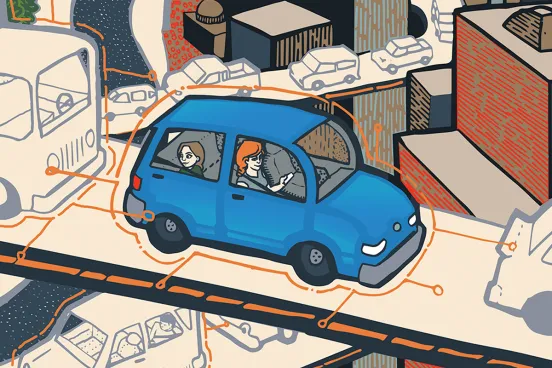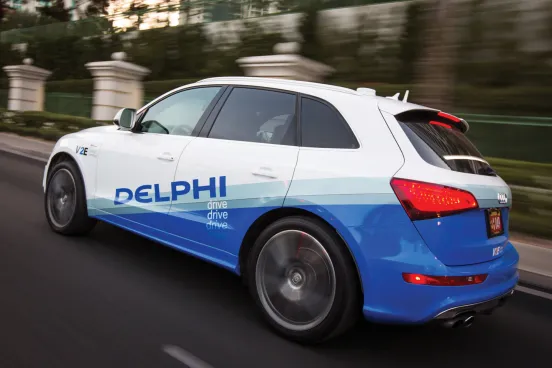
Zack James, ’17, can recall the exact moment when building tractors started to pay off. It was August 2019, and James was sitting in his truck, watching an autonomous tractor move up and down a field, planting seeds. “It was the first time I was being paid to do farming services,” James said. “The fact that I had built that tractor from the ground up and it was out there making money for me gave me a great sense of pride.”
That tractor was James’s third prototype; he’s now on his fifth version, which he is developing for Rabbit Tractors, the autonomous tractor company he founded in 2017 in Cedar Lake, Indiana, about 45 minutes east of Chicago. His current prototype—what he calls his “looks like, works like” iteration—is 90 percent close to what the finished product will look like several years from now.
James’s tractors are smaller, lighter, and more compact than traditional tractors. They are the size of golf carts, weigh approximately 200 pounds, and are completely electric. In addition, there is no steering wheel or manual driving capability.
The tractors also are “swarm-enabled,” meaning they can be run in a swarm of five to 10 vehicles, either in a field together or spread across several fields. This means they can accomplish the same amount of work in a more efficient, cost-effective, and sustainable manner, James noted.
While large tractors are useful for farm operations of 500 acres or more, James said his compact tractors are well-suited to smaller farms whose land is only 35 acres, such as those found in Michigan and Indiana. James’s tractors can easily navigate row crops like corn, soybean, and wheat, and they can be used when the ground is wet, without leaving ruts or compacting the soil.
Though James, a lifelong robotics fan, was poised to join a Big Law firm as an associate after graduation, he forfeited the job to pursue an idea that grew out of an autonomous vehicles class, taught by Frederick Paul Furth Sr. Professor of Law Dan Crane as part of the multidisciplinary Problem Solving Initiative. “I started looking into open-source autonomous vehicles technologies,” he said, “and wondered why they couldn’t be applied to a tractor going two miles an hour in a field.” James knew he was on to something when he won $40,000 in seed capital from a business accelerator in April of his 3L year, especially since John Deere, Pioneer Seeds, and Sukup Manufacturing—big names in the farming industry—were among the accelerator’s investors.
Since then, James has been working 12- to 14-hour days, seven days a week, getting Rabbit Tractors off the ground. He has one full-time employee and a team of five part-timers who are based in Europe and are focused on research and development. His goal is to build 25 to 50 autonomous tractors that his company will operate to perform farm services such as cover crop spreading and smart spraying. He’ll eventually lease a fleet of tractors to co-ops, retailers, and large farmers, much like a franchise operation, “with the eventual goal that we become a manufacturer,” he said. “We want to become the ground-based drone for agriculture.”





![The Tech [R]evolution in Law The Tech [R]evolution in Law](/sites/default/files/styles/teaser/public/2023-03/The-Tech-%5BR%5Devolution-in-Law.jpg.webp?itok=Obrll94p)

